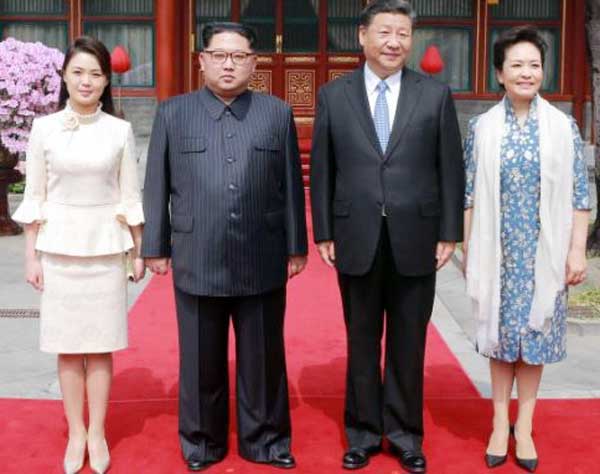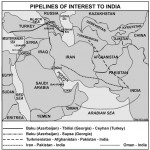The North Korean leader, Kim Jong-un (Kim), accompanied by his wife, visited China during the week 26-31 March; that the formal acceptance of Kim Jong-un’s surprise visit to China was confirmed only after he had departed, on Wednesday, 28 March 2018, highlights the strained relationship between the two long-time communist allies. China was careful to describe the visit as “unofficial”! It was called ‘unofficial’ probably because the Chinese President, Xi Jin Ping is still annoyed and frustrated that Kim has continuously shown an utter lack of respect for China’s interests and for him personally.
…the meeting with Trump would definitely raise Kim’s stature not just amongst his people, but also in the international polity to gain diplomatic recognition, which he so desperately has been seeking.
Since assuming the post of Supreme Leader in 2011, Kim has conducted more than 85 missile tests, one of which was believed to be deliberately timed to upstage Xi’s standing during a BRICS summit in China last September. As an outcome of North Korea’s provocations, China voted in favour of imposing increasingly tough international sanctions on North Korea, as well as cut coal and other imports from the country; China accounts for more than 90% of North Korea’s overall trade and also provides food aid and energy assistance.
Kim’s visit, however, does not so much mark an improvement in ties as it does China’s determination not to be sidelined. The trip comes ahead of the proposed talks in April between Kim and the South Korean president, Moon Jae-in, and the US President, Donald Trump, scheduled for May. In the past, China might have let the US drive the process as long as it was consulted, however, with relations as they are with USA, and with Xi having secured a ‘life-presidency’ for himself, clearly, he seems to have decided that China needs to shape the process early and discuss directly with Kim; by being the first leader in Asia, to meet Kim, Xi has decisively shown as to who is the boss in North-East Asia.
When asked to influence North Korea in curbing its nuclear and missile tests, China often said it did not have as much leverage over the truant nation as many believed. Kim’s visit to China before meeting Trump and Moon, however, is an indication of being contrary to world perception. Just how supportive is China over North Korea’s nuclear programme is yet unclear; whether Kim would agree to denuclearisation during his forthcoming talks with USA has also not been indicated during the just-concluded visit to China.
For Kim, the trip not only bolsters his image at home as a powerful statesman, negotiating with the world’s great powers, it also opens avenues for limited political and economic reforms, even if the reforms are pushed by China. Kim was exposed to a ‘innovation exhibition’ at the Chinese Academy of Sciences in Beijing, to create a probable tangible awareness that opening up and reform, with special economic zones and foreign investment, while maintaining strict parameters on civil society, is a pathway to relative wealth and power. China could have been showcasing its own economy, which has adopted capitalist market-driven reforms while maintaining authoritarian control over its citizens.
India has always considered North Korea’s nuclear proliferation as a consequence of Chinese and Pakistan aid to it, and hence, a threat to its interests.
The visit to China was a surprise, but an even bigger surprise was the announcement that Kim Jong-un would be meeting Donald Trump at a summit in May 2018. Trump, notwithstanding the continued use of his threatening statements of using ‘fire and fury’ against Kim, had indicated in the passing, sometime in 2016, that he was willing to talk to Kim. It was on 09 March 2018, after the ‘Winter Olympics Diplomacy’, that North Korea seemingly changed its stance against its southern neighbour and USA. While announcing the proposed meeting between Kim and Trump in May, South Korea also stated that North Korea had committed itself to denuclearisation of the peninsula by ceasing all future tests and that it also appreciated the necessity of US-South Korea military drills.
Why this sudden change of heart? There are no surprise reasons for this, but there could be some possibilities. First and foremost, Kim could be playing around with South Korean President Moon and USA President Trump, before meeting them, if at all, at the proposed summits. It may just be possible that Kim, during the course of his talks with the respective Presidents, lays some conditions for denuclearisation, which just may not be acceptable to either or both of them, such as, the complete withdrawal of American troops from South Korea. Whether the talks succeed or not, it is too early to conjecture, but the meeting with Trump would definitely raise Kim’s stature not just amongst his people, but also in the international polity to gain diplomatic recognition, which he so desperately has been seeking.
The second possibility could be that this agreement to meet and discuss issues with Moon and Trump, could be a ploy to gain time and have some of the severe sanctions waived off. Kim may be of the opinion that both Russia and China, which have supported the sanctions, may see this as a change of heart on his part, especially if it appears that South Korea and USA were the ones to have walked off from the talks.
Another possibility, the third, which may be a bit farfetched, but nevertheless a possibility, could be Kim wanting to switch camps from China to USA; in the early 1970s, Mao had veered from Russia towards USA, when he felt that Russia was becoming overbearing. Similarly, Kim has been unhappy with the big-brotherly attitude of Xi for some time now, notwithstanding the recent visit to China. Such a move on the part of Kim, could help his country gain recognition in the international community, help him to get foreign aid in terms of food and investments, and stall the ‘fire and fury’ of USA. It just may be that USA, in reciprocity, even accepts North Korea’s nuclear and missile programmes, thus granting it legitimacy!
A successful contribution by India towards the accomplishment of the forthcoming talks would further its diplomatic standing, while strengthening its long-term aspirations of being a viable competitor with China for regional influence.
Such possibilities come with repercussions, especially the last one. China would definitely not welcome such a step, as that would mean, an American ‘ally’ at the southern doorstep. China could be provoked to take some military action to prevent such an agreement, should it go through; in such an eventuality, USA could tell China to keep off, thus disrupting China’s Asia-Pacific plans. Kim too, has to play his cards very carefully, for there are many instances in history when USA has supported authoritarian rulers, but also worked behind the scenes, towards a conversion to a democratic rule. Whatever Kim’s decision would be, it is best known to him! One outcome that is visible to all, more so to China, is that this summit, if it succeeds, would put China on notice as it would increase North Korea’s bargaining power with it.
Where does India fit into this jigsaw puzzle, if it does? India has always considered North Korea’s nuclear proliferation as a consequence of Chinese and Pakistan aid to it, and hence, a threat to its interests. It will, therefore, be expected of India to continue to demand an end to the nuclear and missile programmes.
India and North Korea maintain diplomatic relations, but North Korea has negligible trade ties with India, especially after the fresh sanctions; India now supplies only humanitarian aid, in terms of food and medicines, to North Korea. Participation by India to ensure the success of the forthcoming talks between Trump and Kim, and the follow-up to the talks through economic and trade ties with North Korea, would enhance its stature in Asia-Pacific; such moves would definitely cause anxiety to China, but would need to be done.
Despite the limited leverage over North Korea, India should convince it to denuclearise and initiate some governance reforms, convincing it that the present chosen path has adverse implications for the overall peace and security of the country, and Asia-Pacific as a region, in which India is included certainly. A successful contribution by India towards the accomplishment of the forthcoming talks would further its diplomatic standing, while strengthening its long-term aspirations of being a viable competitor with China for regional influence.
The next two months are expected to disclose some interesting surprises and possibilities, till then all concerned would be working feverishly to ensure that the leaders, first, Kim and Moon, and then, Trump and Kim, meet in a cordial atmosphere, talk to each other, and move ahead.
It would be in the best interest of all.






